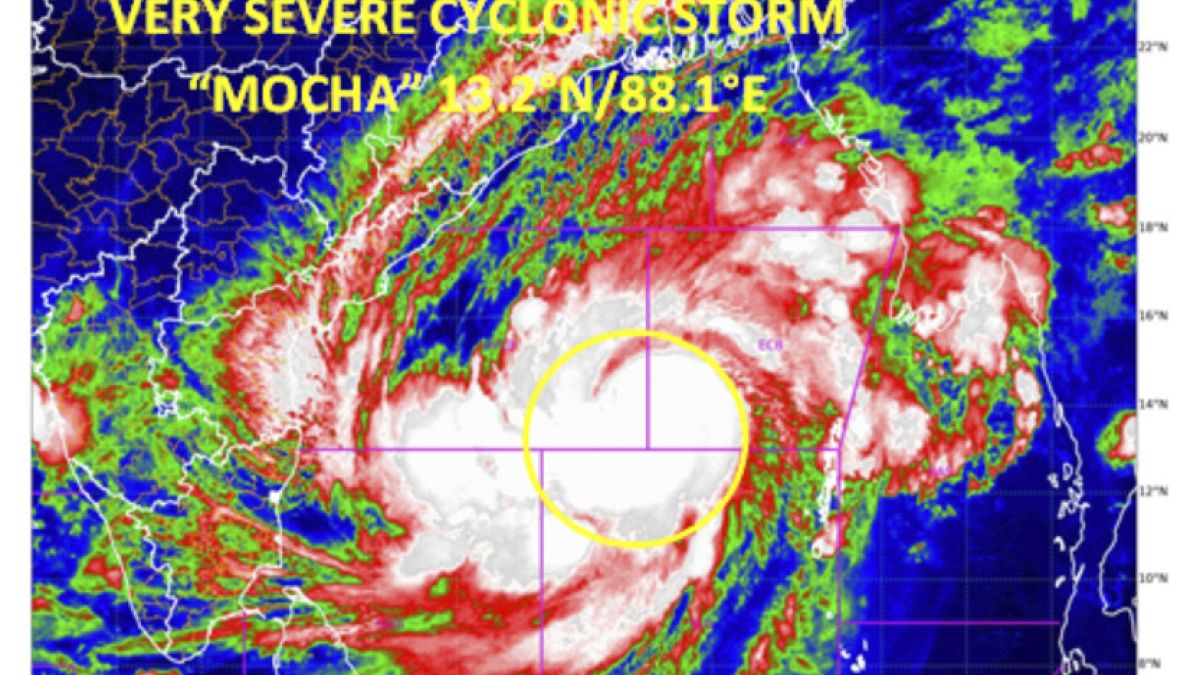Cyclone Mocha is expected to hit Bangladesh and Myanmar on Sunday with meteorologists warning it will bring extreme weather as it comes in from the sea.
Bangladesh and Myanmar are braced for an extremely severe cyclone which has started to hit coastal areas with authorities urging thousands of people in both countries to seek shelter.
The outermost band of Cyclone Mocha reached the coast of Myanmar's Rakhine state on Sunday morning, and by afternoon the centre of the storm was expected to make landfall near Sittwe township, which was under the highest weather alert, Myanmar's Meteorological Department said Sunday.
More than 4,000 of Sittwe's 300,000 residents have been evacuated to other cities since Friday and more than 20,000 people are sheltering in sturdy buildings such as monasteries, pagodas and schools located on the city's highlands, said Tin Nyein Oo, who is helping people in shelters in Sittwe.
Many local residents live in areas more than three metres above sea level, places where residents believe the storm surge cannot reach, he added.
Strong winds of 40 to 48 kilometres per hour were blowing in the city, Tin Nyein Oo said on Sunday morning.
"The storm has not yet entered, so we don't have much difficulty. However, there are too many people in the shelters and not enough toilets," he added.
Lin Lin, the chairman of a local charitable foundation, said earlier there was not enough food in the shelters in Sittwe after more people arrived than expected.
In Bangladesh, weather in most areas remained sunny and humid on Sunday morning.
UN agencies and aid workers in Bangladesh have prepared for the worst with tons of dry food and dozens of ambulances with mobile medical teams in sprawling refugee camps housing more than one million Rohingya who fled persecution in Myanmar.
Bangladesh issued the highest danger signal for Cox's Bazar, home to the camps. The Bangladesh Meteorological Department warned the cyclone could cause severe damage to lives and property in eight coastal districts.
No heavy rainfall had been reported in Cox's Bazar as of Sunday morning.
Bangladesh, with more than 160 million people, has prepared more than 1,500 cyclone shelters. The navy said it's keeping ready 21 ships, maritime patrol aircraft and helicopters for rescue and relief operations.
Authorities in Bangladesh said heavy rains from the cyclone could trigger landslides in Chattogram and Cox's Bazar and three other hilly districts — Rangamati, Bandarban and Khagrachhari.
In May 2008, Cyclone Nargis hit Myanmar with a storm surge that devastated populated areas around the Irrawaddy River Delta. At least 138,000 people died and tens of thousands of homes and other buildings were washed away.
Roxy Mathew Koll, a climate scientist at the Indian Institute of Tropical Meteorology in Pune city, said cyclones in the Bay of Bengal are becoming more intense more quickly, in part because of climate change.
Climate scientists say cyclones can now retain their energy for many days. Cyclone Amphan in eastern India in 2020 continued to travel over land as a strong cyclone and caused extensive devastation.
"As long as oceans are warm and winds are favourable, cyclones will retain their intensity for a longer period," Koll said.
Cyclones are among the most devastating natural disasters in the world, especially if they affect densely populated coastal regions in South Asia.
